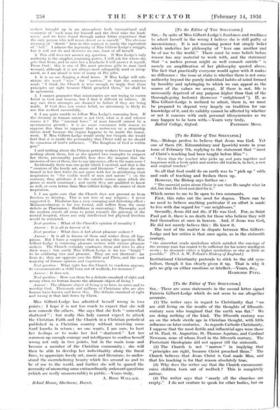[To the Editor of THE SPECTATOR.]
Sm,—Bishops profess to believe that Jesus was God, Yet one of them (St. Edmundsbury and Ipswich) wrote in your issue of February 7th, replying to the statement that " most of Christ's teaching had been taught before Him " :
" Even thus •the teacher who picks up and puts together and impresses with a fresh spirit and motive old truths is, in fact, a new and original teacher."
So all that God could do on earth was to " pick up odds and ends of teaching and freshen them up. However, the Bishop says further on :
" The essential point about Christ is not that He taught what he did, but that He lived and died for it."
Which seems to me to lie open to two comments.
First, this rules out the need for dogma. There can be no need to believe anything particular if an effort is made to live with due regard for " our neighbours."
Secondly, Jesus did not die, if He was God. For, as Saint Paul put it, there is no death for those who believe they will find themselves at once in heaven. And, if Jesus was God, He did not merely believe this : He knew it.
The root of the matter in dispute between Miss Gilbert- Lodge and her critics is that once again, as in the sixteenth century,
" the somewhat crude symbolism which satisfied the cravings of the average man has ceased to be sufficient for his newer intelligent needs ; he demands either a higher symbolism or else as little as possible." (Prof. A. W. Pollard's History of England.)
Institutional Christianity pretends to stick to the old sym- bolism, though it has clearly given it up. That is why it gets no grip on either emotions or intellect.—Yours, &c.,
HAMILTON FYFE.,














































 Previous page
Previous page